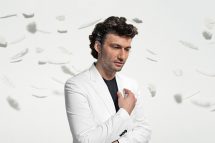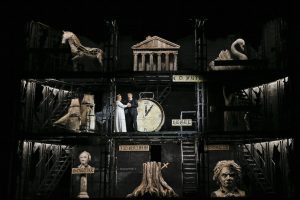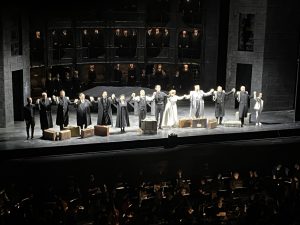Lohengrin

(Melbourne Arts Theatre, 21 May 2022)
Lohengrin marked the end of Wagner’s ‘first phase’ and remains one of his loveliest operas, in musical terms (the overture alone is a gorgeous amuse-bouche)*. The story is, of course, very silly: Elsa (Emily Magee) is accused of doing away with her brother, heir to the Throne of Brabant, the charges levelled by nasty Telramund and his ‘handler,’ Ortrud (the very fine and sexy Simon Meadows and Elena Gabouri). King Heinrich (Daniel Sumegi) calls for divine intervention, and after some nervous foot-shuffling by the assembled knights, there, in a puff of swan feathers, is “X” (Jonas Kaufmann) to engage in battle with Telramund to answer the charge.
After that, it is a matter of the thwarted villains’ plan to disrupt the nuptials and jump the inheritance queue to the throne. Meanwhile, the marriage between X and Elsa is imperilled by X’s Michael Corleone-like refusal to have Elsa ask him about his business, or even his name, which seems to us somewhat arch – even Kaufmann has objected that “Elsa’s not ready to go to bed with a guy whose name she doesn’t even know!” In the event, the hero triumphs, but at the last, curiosity kills the cat.
It is a great cast. We found Gabouri and Meadows fashionable jet-black yet oddly sympathetic bad guys, in great voice and cutting a fine dash; Magee’s Elsa was terrific; though Sumegi, and Warwick Fyfe as the Herald (see below), have little to do, they were suitably magisterial with their booming bass voices. The Opera Australia chorus were in peak form, somehow managing to finesse the clichéd wedding march into a thing of beauty. The Orchestra Victoria (including some impressive heraldic brass in the theatre boxes) under a relatively inexperienced Tahu Matheson, were impeccable. In particular, he and they generously made way for the star of the show, Kaufmann, to soar above the pit without forcing his voice on us – thus managing to retain the precious harmonies of the score by signing pianissimo in extended fashion. It was a real treat to see this Opera Rock Star in a full opera finally, after his wonderful concertized Parsifal in Sydney previously.
As usual, and increasingly these days, The Varnished Culture had quibbles with the mise en scène. Much of the time this managed to keep out of the way, yet it intruded jarringly at times. It was a Regietheater conceit of Olivier Py, originated at the Théâtre Royal De La Monnaie in Brussels, and featured some harmless anachronisms: the sets were to represent ruined post WWII Berlin, including a stopped clock set at five past twelve (‘Zero Hour’ in 1945). The three-tiered wall of bric-a-brac (see top image above) was meant to convey German cultural heritage** – including signage bearing such names as Goethe, C.D. Friedrich, Hegel, Schiller, Heine etc., perhaps a deliberate contrast to the anonymity of the protagonist. During the extended Act III tête-à-tête between Lohengrin and Elsa, the pair wended their way up the stairs of this structure, singing sweetly to each other. All very well to this correspondent, sitting smugly in the first row of the Circle, but a friend with a much better eye and ear in the top tier reports that their voices were muffled and their bodies virtually invisible, drowned in the glare of the surtitles board and Opera Australia electronic badging. Shows that you must rehearse properly. Especially at these prices.
Moreover, there were the usual grab-bag of dopey flourishes. A small boy wandered around, toying with a crown seemingly made of brown butcher’s paper (that’ll be Gottfried, we guess). Lohengrin formally appears, on Shanks’ pony, fiddling with a small mound of ‘swan’ down. Why the Herald lollygags about, taking camera snaps, is beyond us. The duel to clear Elsa’s name is rendered by a chess game and some calisthenics at the rear (we would have preferred an old-fashioned sword-fight, even with clock hands). Similarly, we could have done without the gymnastic Chippendale showing off his pecs in Act III.
“Be All That As It May,” Lohengrin was still a treat. The matinee we attended was highly and deservedly enthusiastic at curtain.
![Opera Australia: Lohengrin review [Melbourne 2022] – Man in Chair](https://simonparrismaninchair.files.wordpress.com/2022/05/lohengrin-opera-australia-warwick-fyfe.jpg)
Leave a comment...
While your email address is required to post a comment, it will NOT be published.




0 Comments